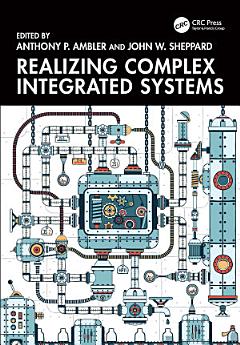Realizing Complex Integrated Systems
Acerca de este libro electrónico
In addition to traditional systems engineering topics of hardware and software design, testability, and manufacturability, there are wider issues to be contemplated: project planning; communication language (an issue for international teams); units of measure (imperial vs. metric) used across members of the team; supply chains (pandemics, military action, and natural disasters); legal issues based on place of production and sale; the ethics associated with target use; and the threat of cyberattack. This book is the first attempt to bring many of these issues together to highlight the complexities that need to be considered in modern system design. It is neither exhaustive nor comprehensive, but it gives pointers to the topics for the reader to follow up on in more detail.
Acerca del autor
Anthony P. Ambler is a fellow of the IEEE, elected ‘For contributions to economics of testing complex digital devices and systems’. His research interests are in test economics, system test, and diagnosis. He received his B.Sc., M.Sc., and Ph.D. from the University of Manchester Institute of Science and Technology. He was appointed to a chair in Test Technology at Brunel University (UK) and then moved to the USA. He became chairman of Electrical & Computer Engineering at the University of Texas at Austin, then dean of Engineering & Computing at the University of South Carolina, and recently as dean of Technology at the University of Houston. In addition to his research work, he created the MS degree program in Engineering Management at UT Austin. He has acted as chair of the Organizing Committee of the European Design and Test Conference, general chair and program chair of IEEE International Test Conference and of IEEE International Conference on Computer Design. He has created a number of Workshops including on Test Economics, System Test and Diagnosis, and Production Test Automation.
John W. Sheppard is a Norm Asbjornson College of Engineering Distinguished Professor in the Gianforte School of Computing at Montana State University. His research interests include fault diagnosis/prognosis of complex systems, model‐based and Bayesian reasoning, explainable and ethical artificial intelligence, and distributed population‐based algorithms. He is a fellow of the IEEE, elected 'For contributions to system‐level diagnosis and prognosis'. He received his BS in computer science from Southern Methodist University and his MS and PhD in computer science from Johns Hopkins University. Before entering academia full‐time, he was a member of the industry for 20 years where his prior position was as a research fellow at ARINC Incorporated. He has been a long‐time leader in the IEEE Standards Association, chairing several working groups focused on publishing standards related to complex system test and diagnosis. Previously, he also served as the designated representative from the IEEE Computer Society to the IEEE Standards Coordinating Committee 20 on Test and Diagnosis for Electronic Systems.





